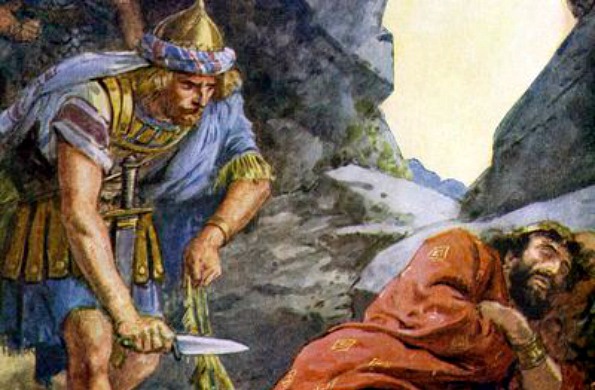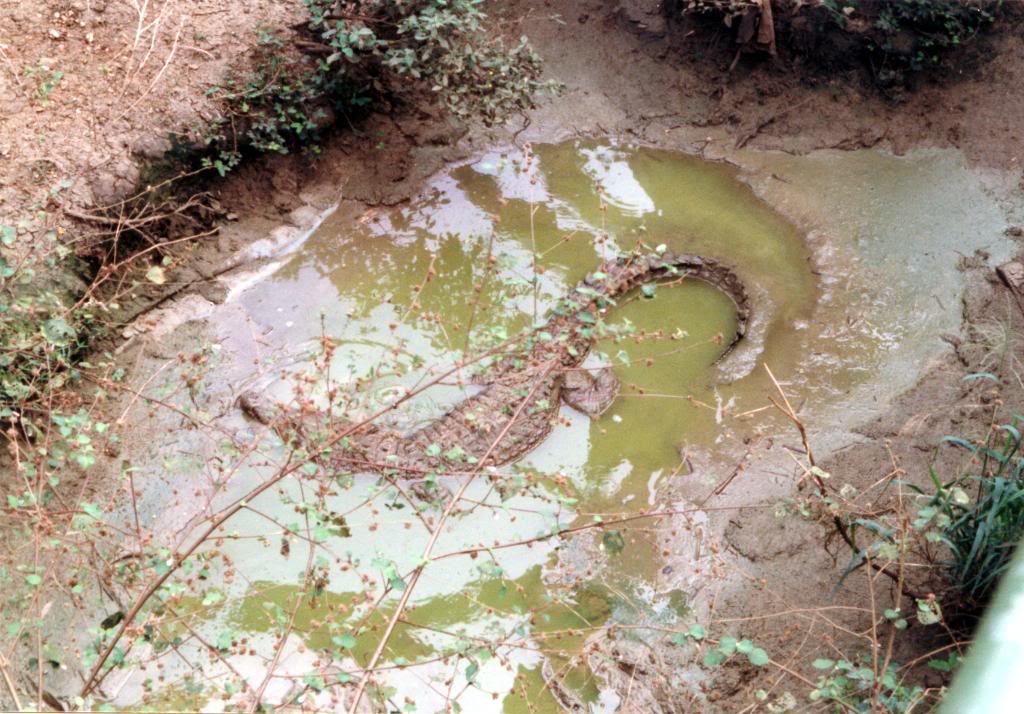I’ve been thinking a lot about Laman and Lemuel and the catalyst/catalysts that launched them from regular older brothers to “murderers in their hearts.”
As I read Nephi’s account of killing Laban again, I looked at the aftermath in a new way. How did Nephi killing the guy who terrified them affect his brothers?
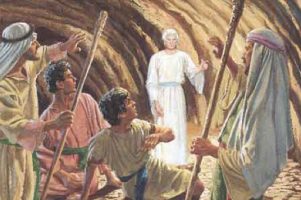
An Angel stops Laman and Lemuel from beating Sam and Nephi.
Laman approached Laban for the plates and left with his knees knocking and his mind determined to give up on the plan. Nephi’s suggestion to buy the plates from Laban resulted in all four brothers running for their lives and hiding in a cave.
Laman and Lemuel were so angry, humiliated, frustrated, disappointed over losing their possessions that they beat Sam and Nephi in the cave so severely that an angel had to intervene. That is super intense. Did Sam and Nephi try to defend themselves or just submit to the beating? We don’t know.
In the next scene of the story, the Lord delivers Laban into Nephi’s hands and commands Nephi to slay Laban, which Nephi does not want to do. He ultimately does slay Laban–the bully who terrorized the family, broke the Mosaic law, and disregarded the Lord’s commandment.
What does that do to the psyche of two older brothers who become bullies and terrorize the family, break the Mosaic law, and disregard the Lord’s commandments? Did they wonder if “Behold the Lord slayeth the wicked to bring forth his righteous purposes. It is better that one man should perish than that a nation should dwindle and perish in unbelief” applied to them? If Nephi could take down Laban, why not them?
When I perceive a threat (real or otherwise) I’ve gone on the offensive. That’s self-survival.
King Saul Became a Murderer in His Heart
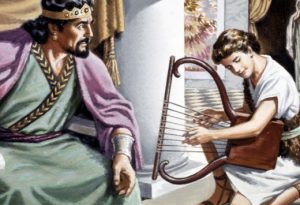
King Saul was jealous of David.
I couldn’t help but think of another example–King Saul and David. David slew the giant Goliath, but that didn’t seem to psychologically threaten King Saul. Saul promotes David to the army’s command. David and the troops victoriously conquered their hugest enemy.
And David went out whithersoever Saul sent him, and behaved himself wisely: and Saul set him over the men of war, and he was accepted in the sight of all the people, and also in the sight of Saul’s servants.
And it came to pass as they came, when David was returned from the slaughter of the Philistine, that the women came out of all cities of Israel, singing and dancing, to meet king Saul, with tabrets, with joy, and with instruments of musick.
And the women answered one another as they played, and said, Saul hath slain his thousands, and David his ten thousands.
And Saul was very wroth, and the saying displeased him; and he said, They have ascribed unto David ten thousands, and to me they have ascribed but thousands: and what can he have more but the kingdom?
And Saul eyed David from that day and forward.
King Saul coveted his kingdom–which was given him by the Lord. He disobeyed a direct commandment and the Lord told him that the kingdom would go to another. The Lord didn’t strip him of his kingship instantly, but Saul became paranoid and murderous of rivals.
Laman and Lemuel wanted to rule the family. Laman’s birthright responsibility named him as family head after Lehi’s death. Like Saul, He disobeyed the Lord’s commandment and was told the leadership would go to another if he didn’t repent. Laman and Lemuel talked about preemptively avoiding that usurping of their rights by killing their father. But they never did. Why not? Were they all talk and no action or did they try and the Lord protect Lehi?
Ye Have Accused Him
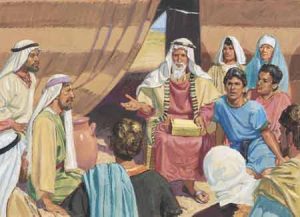
Lehi councils Laman and Lemuel to “cut it out”.
Apparently, everyone knew their intentions. What hard, tense, awkward living conditions.
Before he died, Lehi counseled Laman and Lemuel to stop it. He reminded them that Nephi saved them from hunger and got them to the promised land.
And I exceedingly fear and tremble because of you, lest he shall suffer again; for behold, ye have accused him that he sought power and authority over you; but I know that he hath not sought for power nor authority over you, but he hath sought the glory of God, and your own eternal welfare.
In 1 Nephi 17, everything came to a head when the brothers complain about building the ship they needed to reach the promised land. It must have been a massive issue to get the lecture Nephi gave them. It’s one of my favorite cause and effect chapters in the scriptures, though, so I’m really grateful for it.
Wherefore, the Lord commanded my father that he should depart into the wilderness; and the Jews also sought to take away his life; yea, and ye also have sought to take away his life; wherefore, ye are murderers in your hearts and ye are like unto them. …
And now it came to pass that when I had spoken these words they were angry with me, and were desirous to throw me into the depths of the sea; and as they came forth to lay their hands upon me I spake unto them, saying: In the name of the Almighty God, I command you that ye touch me not, for I am filled with the power of God, even unto the consuming of my flesh; and whoso shall lay his hands upon me shall wither even as a dried reed; and he shall be as naught before the power of God, for God shall smite him.
Later, at the Lord’s command, Nephi stretched forth his hand and the Lord shocked the brothers.
And now, they said: We know of a surety that the Lord is with thee, for we know that it is the power of the Lord that has shaken us. And they fell down before me, and were about to worship me, but I would not suffer them, saying: I am thy brother, yea, even thy younger brother; wherefore, worship the Lord thy God, and honor thy father and thy mother, that thy days may be long in the land which the Lord thy God shall give thee.
The shock effect wore off, but their resentment didn’t.
They tied up Nephi on the boat and only released him when the violent storm threatened their lives. They continued to plot against Lehi and Nephi. After Lehi died, the Lord eventually commanded Nephi to leave with everyone who would follow him.
Seeds of Dissension
Plenty of people in the scriptures kill others for power. But this story of Laman and Lemuel intrigues me because of its progression from “we think dad is crazy, but we’ll still follow him” to “let’s kill Nephi because he wants our power.”
Did Nephi’s conquest of Laban plant the seed of fear that he could conquer Laman and Lemuel, too? Did that fear fester into resentment and accusation and finally a belief that they had to kill Nephi before he killed them?
What seed of doubt or contention or accusation or fear festers in my heart? What prevents me from seeing others as they really are or from receiving the word of the Lord? What thoughts or actions do I keep self-justifying?
Laman and Lemuel’s story is a constant warning voice for me. Their lives show that in the midst of blessings and heavenly manifestations, you can still make a tiny choice to accuse and resent. That tiny choice becomes little steps leading to bigger steps and other foundational choices. “And thus the devil cheateth their souls, and leadeth them away carefully down to hell.”
I am a member of The Church of Jesus Christ of Latter-day Saints. I have moved 64 times and have not tired of experiencing this beautiful earth! I love the people, languages, histories/anthropologies, & especially religious cultures of the world. My life long passion is the study & searching out of religious symbolism, specifically related to ancient & modern temples. My husband Anthony and I love our bulldog Stig, adventures, traveling, movies, motorcycling, and time with friends and family.

